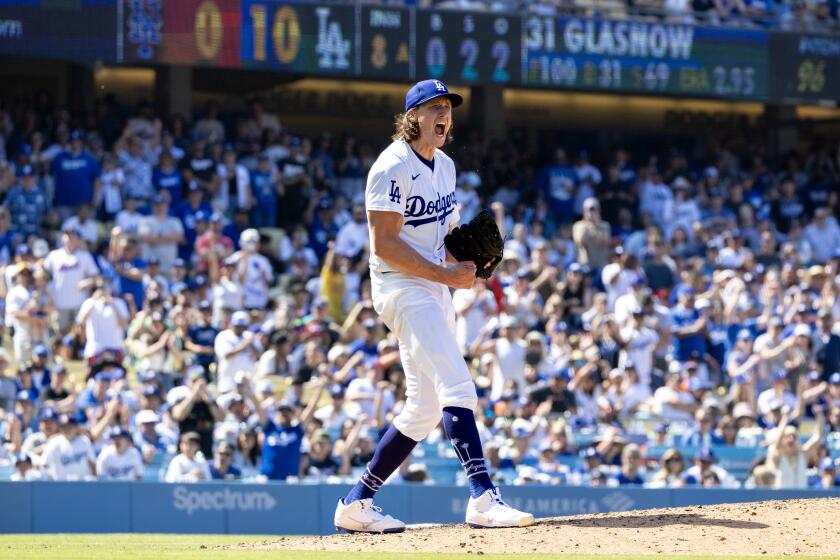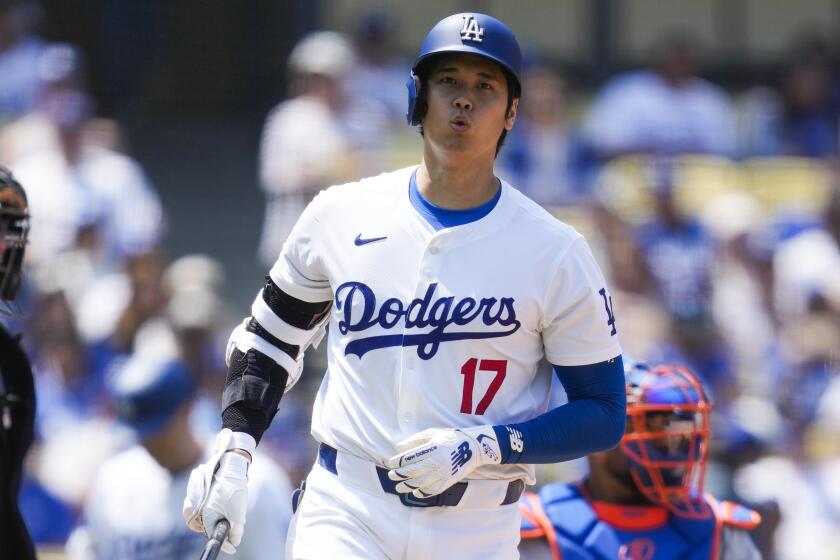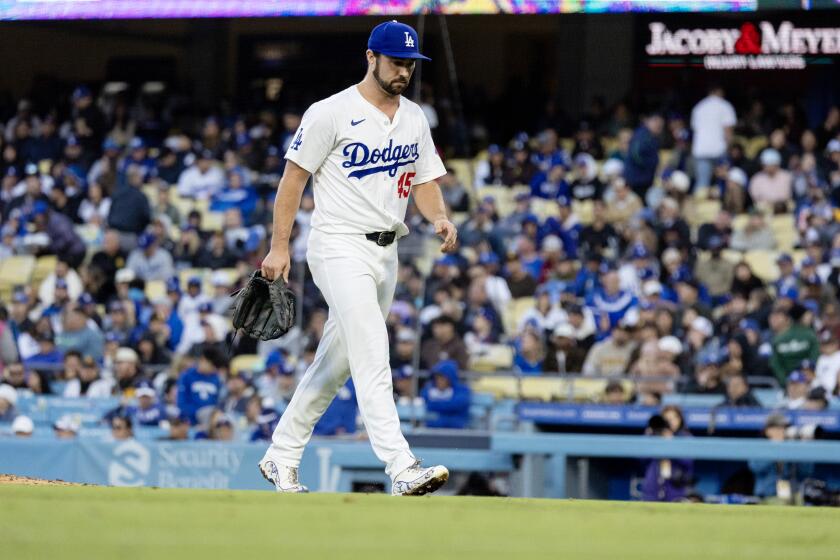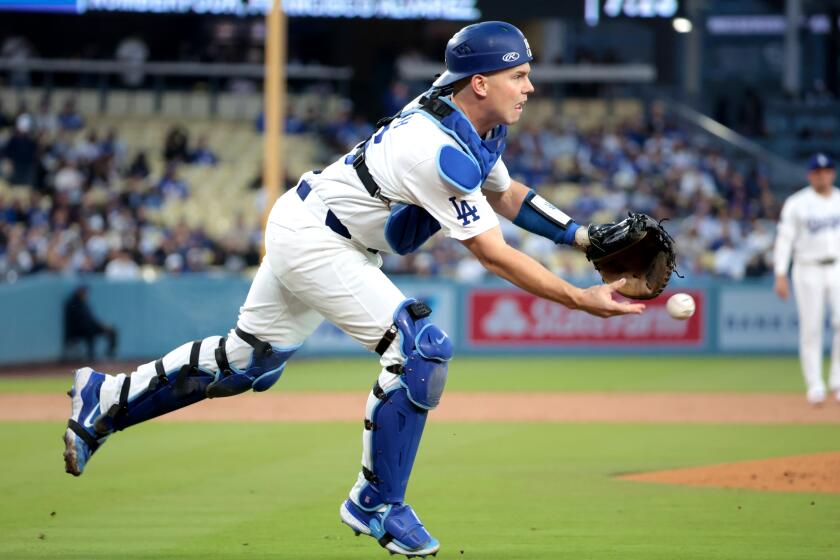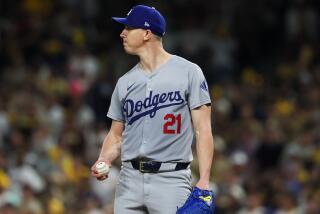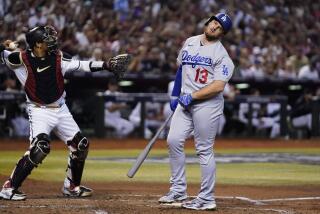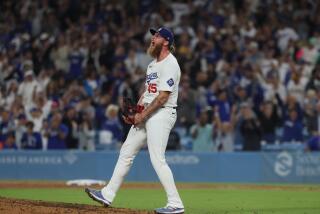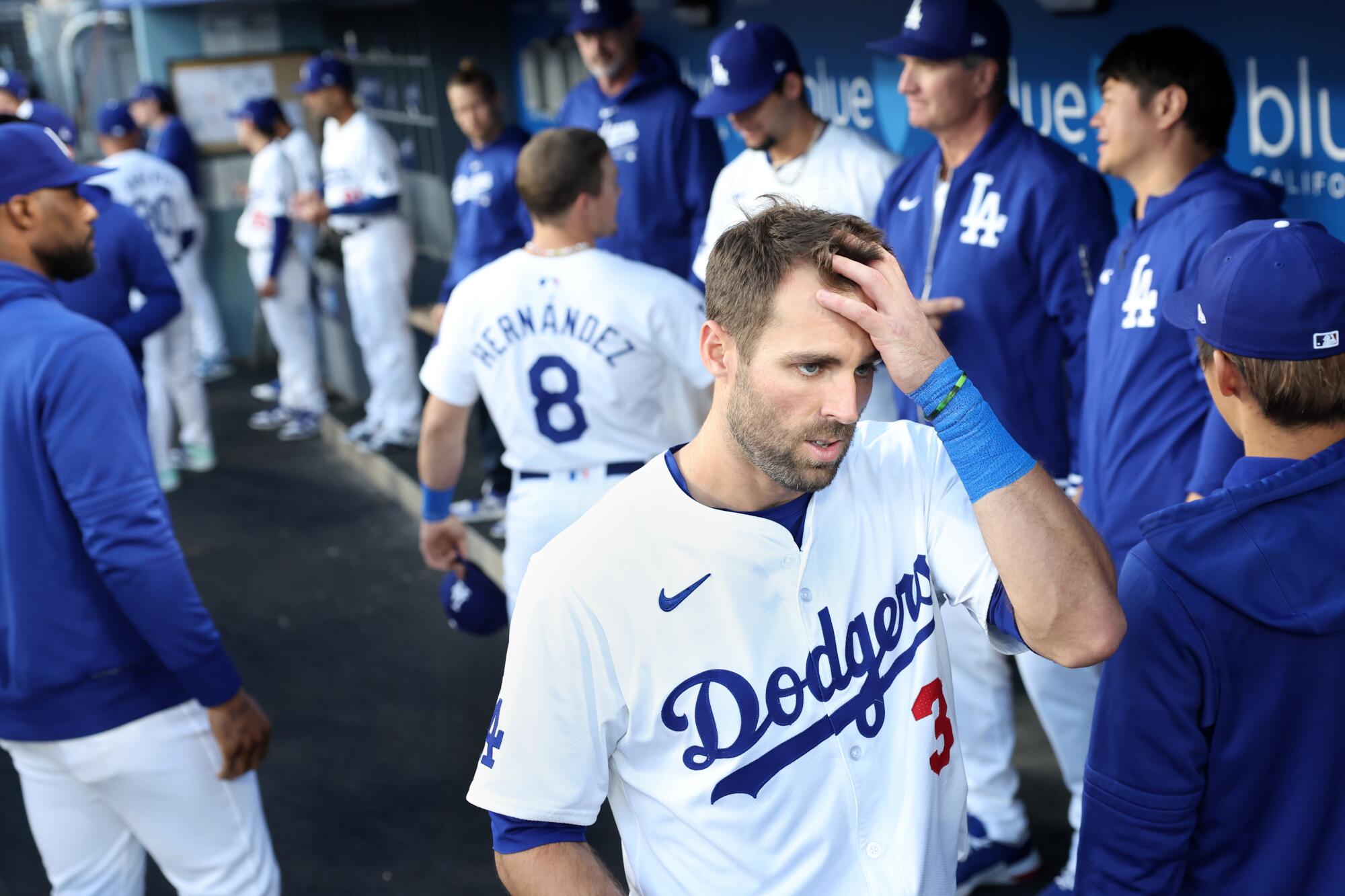
- Share via
Was it just a bad week, or something more ominous?
Near the end of the Dodgers’ recent — and turbulent — 3-6 homestand, in which the team lost three straight series to three non-playoff teams from last year, manager Dave Roberts responded to that question with an unequivocal answer.
“I think it’s just a bad week,” Roberts declared. “I really do.”
The reality, however, seems a bit more complicated. The Dodgers, as the last nine games showed, don’t look as invincible as many once thought.
Granted, over the course of a 162-game season, every team — even ones such as the Dodgers with their $300-million payroll — will encounter inevitable lulls. Given the club’s lengthy list of injuries and sizable cast of underperformers, maybe it shouldn’t be a shock they are only 13-11 after almost a month.
Tyler Glasnow strikes out 10 over eight innings and Shohei Ohtani and Andy Pages hit home runs as the Dodgers defeat the Mets 10-0 for a much-needed win.
“If we just play better baseball, we’re going to win,” said first baseman Freddie Freeman, whose weeklong slump to start the homestand represented one of several seemingly isolated issues bound to correct itself with time.
“Our team is way too good,” Freeman added. “I think we all know that. And I think we’re going to be just fine soon.”
The Dodgers, though, were designed to be much more than “just fine” this year. After spending $1.4 billion in the offseason, and making star acquisitions in Shohei Ohtani, Tyler Glasnow and Yoshinobu Yamamoto, the anticipation surrounding this season’s club was palpable. The franchise’s already sky-high expectations ascended to stratospheric levels.
It didn’t mean the team entered the year free of doubts. From the start of spring training, their makeshift defense, banged-up bullpen and roster depth both at the plate and on the mound loomed as potential stumbling blocks.
None of those concerns, though, were expected to become major impediments.
And during the Dodgers’ 10-4 start, the impact of such weaknesses seemed rather mild, even as the team played only three of four “complete games” in Roberts’ estimation.
“We’re still winning more than we’re losing,” Roberts said a week ago.
Only then, as a nightmarish homestand unfolded, his team no longer was.
Over the last 10 days, the San Diego Padres, the Washington Nationals and the Mets each came to town, each took two of three games at Chavez Ravine, and each exposed the Dodgers’ underlying fallibility ever more glaringly.
To say the Dodgers are suddenly facing a bunch of red flags would be an overreaction.
But writing off this homestand as nothing more than a temporary blip ignores the longer-term liabilities left to address, too.
“No one is gonna feel sorry for you,” Roberts said Saturday night, before the Dodgers finally flexed their muscles in a 10-0 rout of the Mets on Sunday in the homestand’s finale. “You have to play the game the right way and expect things to turn.”
Dodgers pitchers struggle and their stars can’t deliver at the plate in a 6-4 loss to the New York Mets that sends them to their third straight series loss.
Twenty-four games in, here’s what the Dodgers know for sure:
- They have perhaps the most potent collection of star hitters in baseball. After Sunday’s rout of the Mets, Ohtani, infielder Mookie Betts and catcher Will Smith were all batting .346 or better. Freeman also got his batting average back up to .287 with consecutive two-hit performances over the weekend. As long as that quartet stays healthy and consistent, the Dodgers’ offense, which currently ranks eighth in the majors at just over five runs per game, should remain a force.
- They have a true ace in Tyler Glasnow, who is now 4-1 with a 2.92 ERA after throwing eight scoreless innings against the Mets on Sunday, and a dependable closer in Evan Phillips, who continues to perform like one of the top relievers in the sport with a 1.04 ERA in nine outings this year.
- They have help on the way, especially on the mound. Walker Buehler could rejoin the rotation in the next couple of weeks. Bobby Miller’s shoulder injury is not believed to pose a long-term threat. Brusdar Graterol and Blake Treinen are on the mend after sitting out the opening month because of injuries. Clayton Kershaw, Dustin May, Emmet Sheehan and others could also enter the picture later in the year. In a perfect world, the pitching staff will look much different in a few months than it does right now.
On the other hand, the Dodgers also have several unresolved problems, flaws for which they have few clear answers:
- Other than Glasnow, the rest of the rotation hasn’t been great. Yamamoto’s transition to the majors has been bumpy, with the Japanese right-hander owning just a 4.50 ERA in his first five starts (only one of which went past the fifth inning). James Paxton (2-0, 2.81 ERA) and Gavin Stone (1-1, 6.00 ERA) have battled consistency issues. And as a group, non-Glasnow starters have combined for just a 5-4 record, 4.40 ERA and 74 ⅔ innings (or, about 4.4 innings per start) so far. The return of Buehler, Miller, Kershaw and others should help. But as they recover from injuries, none are certain to be automatic upgrades.
- Other than Phillips, few others in the current bullpen have been sharp. Ryan Brasier (5.59 ERA) and Joe Kelly (7.00 ERA) have regressed after re-signing with the team this winter. Daniel Hudson and Alex Vesia have sub-3.00 ERAs, but have also been the culprits of several late-game losses. And though Graterol and Trienen will undoubtedly bolster the unit, the threat of future injuries will make the lack of reliable relief depth a concern even when they come back.
- Other than the top four, the club’s lineup is anything but daunting. Teoscar Hernández has five home runs, but also a team-high 34 strikeouts. Max Muncy is right on his heels with 32 punchouts, despite hitting four long balls. And entering play Sunday, the team’s Nos. 6-9 hitters were batting a woeful .182 combined, the third-worst such average in MLB.
Injuries and the early-season struggles of two right-handers who were dominant for the Dodgers in 2023 have thinned out a bullpen expected to be solid.
“The message is just keep playing, keep preparing, keep competing,” Roberts said Saturday night. “I definitely didn’t foresee [an early season stretch like] this. But that’s why you have to play.”
The Dodgers’ hope is, the more they play, the more their issues will be rectified in time.
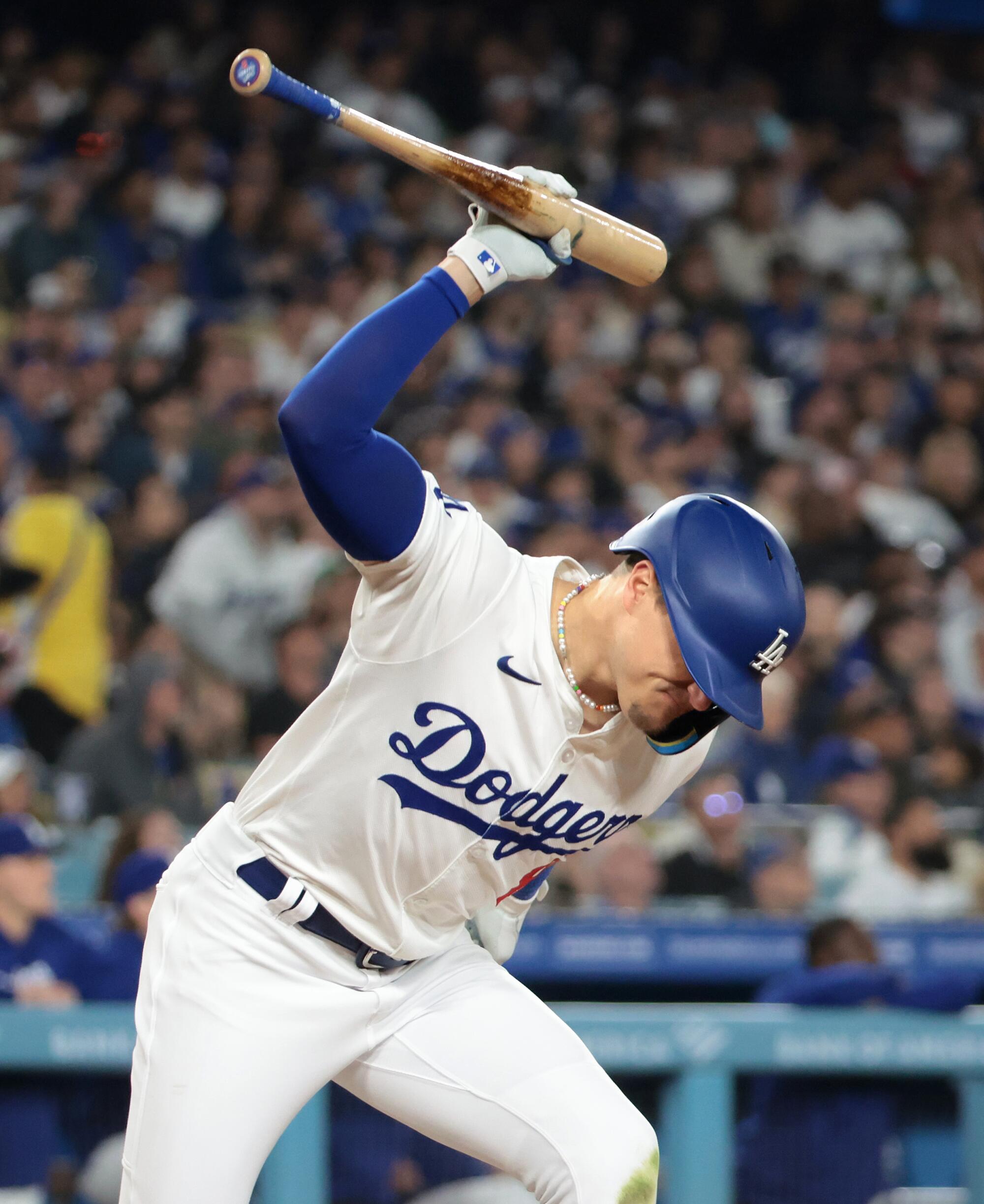
Bottom-half hitters such as Kiké Hernández, James Outman, Gavin Lux and Chris Taylor probably (or, at least, the Dodgers hope) won’t have sub-.200 batting averages forever. The team’s nearly 24% strikeout rate, which ranks 10th-highest in the majors, is also a slight jump from the last several seasons, suggesting a potential regression to the mean over a larger sample size.
“We’ve just got to pull through,” Muncy said. “It’s just one of those things where you’ve got to weather the storm, grind through it.”
Still, if this homestand was any indication, the Dodgers’ path to success this season might not be as smooth as anticipated.
Even after Sunday’s shutout, the team’s pitching staff ranks just 17th in MLB with a 4.13 ERA. Defensively, they’ve looked mostly mediocre, ranking seventh in defensive runs saved but 18th in Fangraphs’ analytical “defense” rating.
As a result, they are giving up the 12th-most runs per game (4.54) in the big leagues right now — putting added pressure on an offense susceptible to swing-and-misses and struggling to capitalize with runners in scoring position (the Dodgers’ .254 batting average in such situations ranks just 18th in the majors and represents a steep drop from last year’s sterling .276 mark).
“I wouldn’t say I feel guys pressing,” Roberts said. “But it is hard to feel like you have to play perfect baseball offensively. Like, if you don’t cash-in in a certain inning, that it’s gonna cost you. So I think there’s something to do that.”
The Dodgers committed more costly errors on defense in a 9-4 loss to the New York Mets that puts them in danger of dropping a third consecutive series.
Again, none of these problems should prevent the Dodgers from reaching the postseason for a 12th straight season (Fangraphs’ computer projections give it a 90.1% probability), making a run at their 11th NL West title in that span (68.9% probability), and entering October positioned to win a World Series (14.1% probability, better odds than any team except the Atlanta Braves).
The core of the roster is flush with talent. The potential it possesses has appeared in tantalizing flashes.
Yet, last week’s homestand offered a conversely troubling reality check, serving as a reminder of the many potholes still threatening to throw the Dodgers’ season off course.
“There’s things that we’re going to keep an eye on in all facets,” Roberts said. “But I think this is something that is a bad week.”
More to Read
Are you a true-blue fan?
Get our Dodgers Dugout newsletter for insights, news and much more.
You may occasionally receive promotional content from the Los Angeles Times.

